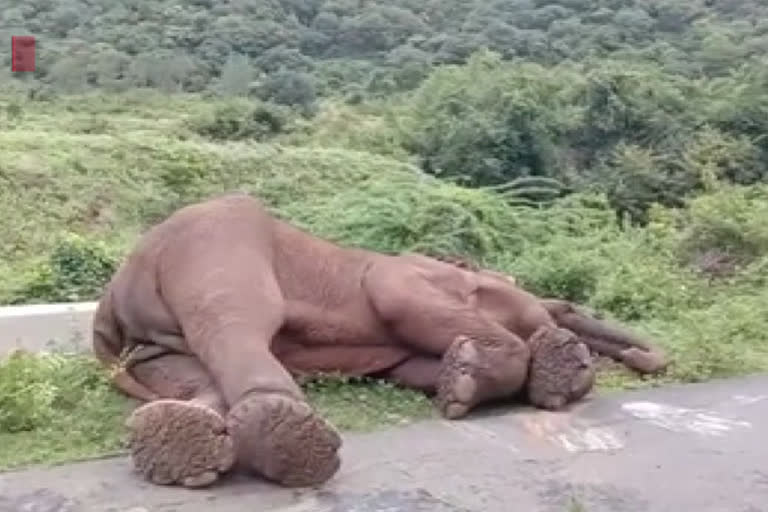Chennai (Tamil Nadu): As is a known fact, nature's equilibrium can be maintained in a beneficial way only if wildlife is protected carefully. In Tamil Nadu however, among several things long taken for granted, are the issues of man-animal conflict and poaching of wild animals.
It has been a common practice among farmers to resort to poisoning, net trapping and shooting in order to shoo away the invading wild animals from their fields. In fact, this harmful practice has triggered the extinction of several animals on a large scale and loss of nature's equilibrium.
Of late, animals such as elephants, leopards, lions, deer, monkeys, wild dogs, and even birds are being killed in large numbers in reserve forests. Expressing concern over this trend, wildlife activists say wild animals are killed to extract and make commercial use of tusk, skin, meat, fangs, honey, lacquer and silk. They also claim that in this racket, the officials' apathy has a bigger role, and stress on the need for educating and enlightening the farmers on the importance of wild animals.
According to government data, in the past three months, the farmers' practice of using poison and net traps in the Nilgiris reserve forests cost nine leopards their lives. Moreover, in the forests of Coimbatore and the Nilgiris, 29 elephants were killed in hunting and shooting in 2020. In the Mudumalai sanctuary, two tigers, five wild dogs and one wild boar were poisoned to death.
Speaking about the issue, Q. Ashoka Chakravarthi, Assistant Professor of Environmental Science in Tiruchi and wildlife researcher, said the human-wildlife conflict is, of late, on the rise. If it is not brought under check, ultimately mankind as well wildlife will be put on the road to extinction.
Read: Injured elephant dies in Tamil Nadu
The actual problem has originated from the human habit of encroaching upon animal habitats. Particularly, elephants have lost their habitat and are pushed into the situation in which they come calling at the human residential places. Likewise, the birds also fall prey to human aggression, he said, adding that the deaths of animals are on the increase in forests, showing the officials' nonchalance over the issue. Even if the tormentors of animals are booked, no great headway is made in the cases, he remarked.
"Why do the animals enter into human habitats? We, human beings, are responsible. In our technical parlance, it's called anthropogenic activity. It means man-made reason. But we are blaming animals," Chakravarthi said.
"What is the solution to this problem? We can create a strict enforcement mechanism; an anti-poaching move. There are scores of graduates unemployed, particularly zoology graduates. They can be given temporary employment in protective zones like wildlife sanctuaries," he added.
Wildlife Protection Act, 1972
The Wildlife Protection Act was passed in Parliament in 1972 and subsequently amended seven times. In order to provide protection to the wildlife including animals, birds and plants, it has stipulated that hunting and harming of animals and birds are cognizable offences inviting penalty and punishment.
However, the law seems to be only on paper. Wildlife activist S Muralidharan said this law was enacted in 1972.
Read: Elephant with torn ear spotted in Tamil Nadu
"Things that prevailed in those days have changed a lot now. Much water has since flowed under the bridge. Changes in keeping with the modern times must be brought in for it is forest personnel who are mainly responsible for the killing of animals. In the last week alone, four elephants have died. In all, there are 2,760 elephants living in various forest areas of Tamil Nadu," he remarked.
Continuing to speak on a note of concern, he said, "If this trend continues, the equilibrium of the animal population will go haywire. A few years ago, the proportional ratio of male and female elephants was 1:10 or 1:20. But now as per the current estimate, there are 30 or 40 female elephants for one male elephant."
Regarding the dismal wildlife situation, Forest Minister Dindigul Seenivasan has said, "I have ordered the officials to conduct an investigation into the deaths of elephants, tigers, and leopards. If violations of rules and regulations are found, appropriate action will be taken."
It is to be noted that on January 20, an elephant died of wounds sustained as its ear was torn apart in an attack by a burning tyre hurled at it when it tried to storm into a house in the Machinakudi forest area in the Nilgiris. In yet another encounter on January 14, an elephant was fatally hit by a container lorry when it tried to cross the national highway road near Hosur in Krishnagiri district.



